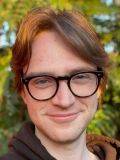Alessia Eletti

Prior to becoming a PhD student at the Department of Statistical Science, I completed an MSc in Computational Statistics and Machine Learning at UCL in 2020 and a BSc in Statistics, Finance and Insurance at La Sapienza University of Rome in 2019.
When it came to choosing my university degree, I knew I had always been interested in mathematics related subjects. I started looking into my options and found that Statistics was the perfect mix of mathematical rigor and real-world applicability. By the end of my BSc I had also developed a curiosity for Machine Learning techniques so I did my dissertation on a comparison of statistical and machine learning methods applied to Credit Protection Insurance on US mortgages. This resulted in a published paper and my first public presentation at a conference.
To further deepen my knowledge of both Statistics and Machine Learning I chose the MSc in CSML at UCL. After the first few months of being exposed to such a lively and dynamic environment, I became enthusiastic about research and decided I would do a PhD in Statistics. The numerous conversations I had with my now supervisor Professor Giampiero Marra were an important part of this decision. In this sense my MSc dissertation, also supervised by Professor Marra, served as a test ground on which I explored statistical modelling as I had never seen it before. In particular, I worked on developing flexible parametric models in the context of excess hazards and competing risks.
My current interests remain in the field of flexible and robust parametric modelling in survival analysis. I immediately found this very inspiring as I felt it could have a truly profound impact in applications such as cancer epidemiology studies and research on degenerative diseases. In fact, we could provide clinicians and specialists with instruments which can aid their decision-making process while complementing their field experience.
Ayao Ehara

I am a PhD student researching both theory and applications of Gaussian process regressions and reproducing kernel Hilbert spaces with Professor Serge Guillas. My primary goal is to establish a methodology of recovering a black-box function, which is typically the solution of a complex system of differential equations, with feasible computational time. Before coming to UCL, I completed the master program of statistics at the University of Tokyo with an emphasis on econometric modelling and worked as a government official subsequently.
At that time, statistical methods, including statistical machine learning, were beginning to attract attention as innovative techniques that could solve many problems. Also, as I saw and heard how these methods elegantly solved not only academic but also practical problems, it seemed to me that the boundary between academia and the business world was becoming blurred in a positive sense. Regardless of whether I was in academia or practice, I thought that an essential insight into statistics would be a great help in understanding the world. To put it bluntly, I entered the PhD program to satisfy my intellectual curiosity to visualize the functions that describe the movements of our world by statistics.
UCL is the birthplace of statistics and one of the most active research centres in the world today. If you have an insatiable intellectual curiosity and a passion for research, this research environment, including many opportunities of discussing the latest research topics with the brilliant researchers, will surely satisfy you. If you are interested in exploring the frontiers of statistics, UCL is the place for you.
Mariya Mamajiwala

I come from Civil Engineering background. I chose engineering because I wanted to do something that required mathematics along with a certain emphasis on applications. After completing my B.Tech from Visvesvaraya National Institute of Technology (VNIT), Nagpur, India, I went on to do my M.E. in Civil Engineering, with specialization in Structural Engineering from the Indian Institute of Science (IISc), Bangalore, India. The learning curve during my M.E. was astonishingly steep; I studied subjects ranging from stochastics and Monte Carlo methods to finite element analyses, the mechanics of solids and structural dynamics. For my M.E. thesis, I worked on a combinatorial data assimilation problem.
I started my PhD with Prof. Serge Guillas at the UCL in 2018. My current work lies at the intersection of Monte Carlo methods, Riemannian differential geometry and stochastic differential equations with a bit of physics thrown in. So far, I have worked on developing algorithms for Markov chain Monte Carlo, optimization and calibration using differential geometry for stochastic differential equations. I also did some work for efficiently estimating parameters of a dynamical system within a data assimilation framework. Right now, I am working on restricting diffusions using a slew of approaches, two of which are Feynman's path integral formalism and 2D cubic spline approximation to solve a partial differential equation (in 2D space and time) both in conjunction with Doob's h-transform. I love to learn concepts from mathematics and apply them to develop algorithms or solve engineering problems after what feels like surviving through a relentless torrent of theorems and proofs. It fills me with a mixed sense of power and pleasure that is beyond compare. In the near future, I would like to learn concepts from Weylian differential geometry, Cartan's moving frames, gauge theory as well as a few other aspects of theoretical physics and apply them towards developing efficient Monte Carlo methods.
UCL provides an excellent environment for research indeed. Particularly, at the department of statistics, there is a broad spectrum of research areas to choose from and there are several opportunities to collaborate. There is access to amazing libraries, and several reading groups, workshops and courses. I was glad to find out however, that coursework for PhD students is optional, it frees up a lot more time to focus on research. There are also very many interesting clubs and societies to join. As an added benefit, being in London is great to fulfil your wanderlust if you are anything like me!
Max Hird

By the end of my undergraduate degree, the only models I had encountered were fully deterministic, having dropped probability and statistics in the second year of my studies. I finished with specialisms in Mathematical Biology, Fluid Dynamics, and the Philosophy of Maths. After working for a couple of years, I was dissatisfied with the lack of depth of understanding required, and I spent my free time reading papers and doing recreational problems in maths and programming. The obvious next step was to go back into academia. I chose to move into statistics since statistics (and therefore probability theory) is indispensable to all of the practices by which we can know anything about the world.
I decided to join the statistics MSc at UCL, which was a rewarding programme, offering a broad range of modules to choose from. Being a student in the statistics department is excellent: I found the faculty very friendly and open to inquisition. In the course of the master's the potential of PhD opened up. I say potential, because I had never really thought doing a PhD was a viable option; reserved for those that were much cleverer. I did my master's project in the same field as my PhD: Adaptive Markov Chain Monte Carlo, with my current supervisor Sam Livingstone. I am trying to find ways to sparsify the adaptive parameters, to offer an accelerated algorithm with an output of equivalent quality.
Zhaojing Che

I was deeply attracted by statistical research in medical science and public health when I did my undergraduate study at the University of Edinburgh. My undergraduate dissertation involved estimating the size of a hidden population, which is often of interest for epidemiological and medical research. Estimating the number of injecting drug users within the city is a typical application in real life. During my final year of study in Edinburgh, I gained practical experience of Bayesian analyses of real datasets using a range of biostatistical models. Due to my great interest in the development of statistical methodology, I pursued a masters degree in Statistics at Imperial College London and finished an interesting project about Carry-over Designs in Clinical Trials.
Currently I am doing a PhD under the supervision of Prof Gianluca Baio and Dr Nathan Green. My main interest is in Bayesian statistical modelling for survival analysis in health economic evaluation. More specifically, the work involves survival extrapolation of short-term trial data in the presence of non-proportional hazards and survival network meta-analysis for indirect treatment comparison in oncology research.
Zhuo Sun

I am a PhD student at UCL with Dr. Francois-Xavier Briol and Dr. Jing-hao Xue. I am interested in computational statistics and machine learning. My goal is to design novel and scalable statistical machine learning methods. Since the start of my PhD life at UCL, I have conducted research in several fields, e.g., meta-learning and kernel methods. Prior to UCL, I accomplished a MSc degree in Statistics with distinction at University of Oxford.
My reason to start a PhD is the curiosity, which drives me here. Most of methods in the textbook are essential and fundamental. However, sometimes they do not work well in practice. The Department of Statistical Science and the CSML community at UCL provide every PhD student with extraordinary resources to current cutting-edge methods. Doing a PhD at UCL allows you to largely explore the fields and finally you can make a breakthrough by standing on the shoulders of the giants.
 Close
Close

